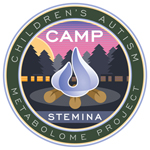About This Project
Autism spectrum disorder (ASD) can be diagnosed through behavioral assessment by a trained clinician as early as 24 months. However, the average age of diagnosis in the United States is 4 ½ years.
Our past research1 suggests that ASD can be identified by evaluating metabolites in the blood of children. The Children’s Autism Metabolome Project (CAMP) is designed to test the hypothesis that we can provide an ASD diagnosis in children as young as 18 months.
Ask the Scientists
Join The DiscussionWhat is the context of this research?
Without a test to identify kids at risk of ASD, many are diagnosed late. It’s difficult to know what’s “normal” for a developmental milestone vs. what’s delayed for an individual child, so many parents or pediatricians "wait and see," which may lead to delayed diagnosis and loss of time to intervene. One thing is clear: children with ASD who have early intervention have a much better outcome than those who are treated later.
Even when a child is referred to a specialist for behavioral assessment, the wait time may exceed a year. Our blood test will screen children who show signs of delay and prioritize additional testing. Beyond diagnosis, our test may make it possible to target interventions based on the child’s own metabolism, rather than randomly trying modified diets or supplements.
What is the significance of this project?
We have found that some children show an increased risk of ASD or neuro-developmental delay, based on how they process certain amino acids.
Altering diet can improve behavior and cognitive function for some children, while supplements help others. Parents don’t know which of these changes will help their child. NeuroPointDX will provide specific information about the child’s metabolism, which may inform more precise intervention.
The National Institutes of Mental Health and the Nancy Lurie Marks Family Foundation have provided $6 million to support our clinical study, the Children’s Autism Metabolome Project (CAMP). Over 1,000 children have enrolled. The results show >94% specificity for certain amino acid imbalances and diagnosis of ASD or developmental delay.
What are the goals of the project?
We have enrolled over 1,000 children, but enrolling patients and collecting blood samples is just the beginning of the work. To finish the study, we need to analyze the samples, and identify and validate metabolic imbalances associated with ASD. Our team has already validated a panel of amino acid imbalances that can identify about 30% of the children with ASD.
Our goals are to analyze all the samples and identify additional biomarkers to use in our testing. In parallel, we will commercialize the first-generation test panel. This will give doctors a tool to identify ~30% of children with ASD as young as 18 months. With your help, we will continue to improve the test to include an even greater percentage of children
Budget
There are substantial costs associated with recruiting, enrollment, and participation in the CAMP study. Patient costs are a necessary component of many research studies. We have received significant support from NIMH and from the Nancy Lurie Marks Family Foundation for this aspect of the CAMP study. However, we are still recruiting patients and calling patients back for follow-up visits. Your support will leverage all of the funding that has gone into the CAMP study to finish this important work.
Additional funding is needed to support sample and data analysis and validation of additional subtypes of metabolism to complete the CAMP study. This budget item will provide supplies, instrument time and staff time to analyze sample data. Subtypes identified through these efforts will be added as next generation panels to the already validated amino acid panel.
Endorsed by
 Project Timeline
Project Timeline
We have been working on this project since 2011. The CAMP study has been a huge undertaking with many benchmarks along the way to our ultimate goal of helping children and families by making this technology available to physicians and clinicians. We look forward to meeting our next milestones in publishing the data in a major scientific journal. These milestones will allow us to raise more significant funding, but we need your help now to get there.
Nov 10, 2014
Stemina and Dr. Amaral publish study results in PLoS One and begin a second study of the Autism Phenome Project samples.
Jan 05, 2015
Began planning autism research study: site recruitment, establishment of protocols, search for additional funding, and more.
Nov 28, 2016
CAMP reaches 500 participants enrolled!
Sep 25, 2017
CAMP reaches 1,000 participants enrolled!
Nov 20, 2017
Prospective study is completed on the first set of metabolites. Stemina receives its CLIA laboratory registration number.
Meet the Team
Affiliates
Affiliates
Team Bio
Team members working closely with NeuroPointDX have experience at Eli Lilly, EMD Millipore (Merck), Abbott Laboratories, Third Wave/Hologic, Roche Diagnostics, Courtagen Life Sciences, Exact Sciences, and Myriad developing tests to diagnose and inform more precise treatment. Their individual passion and work ethic is combined with their collective experience to create the ideal team to succeed at this research and commercialization.
Elizabeth Donley
Elizabeth L. R. Donley, J.D., M.B.A., M.S. Ms. Donley is a founder and Chief Executive Officer of Stemina Biomarker Discovery, a company focused on biomarker discovery through its proprietary metabolomics platform technology. Ms. Donley is a patent attorney who served as General Counsel and Director of Business Development for the Wisconsin Alumni Research Foundation (WARF), the patent and licensing organization for the University of Wisconsin, for more than eight years. She holds a law degree from the University of Wisconsin, an MBA in Finance from UW-Whitewater and a Masters of Science in Bacteriology from the University of Wisconsin.
Jim Fuller
Jim Fuller, Ph.D., DABCC, FAACC. Dr. Fuller is an experienced laboratory executive and clinical laboratory director with expertise in testing, accreditation, quality, and operations of clinical laboratories. He is board certified by the American Board of Clinical Chemistry (ABCC) and is a Fellow of the Academy of the American Association for Clinical Chemistry (AACC). He is a graduate of New England College, East Carolina University, and the University of North Carolina where he earned his Ph.D. in Microbiology and Immunology. Dr. Fuller has worked in both large high-throughput and small start-up laboratories working to provide personalized medicine testing to aide providers and benefit patients. He is an Army veteran that served as a leader, paratrooper, and medic. Dr. Fuller is a Past-President of the North Carolina Academy of Science and is an active advocate for science, science education, and the public appreciation of science.
Robert Burrier
Robert E. Burrier, Ph.D., Dr. Burrier is a career technology executive with experience in pharmaceutical research, ‘biosupplier’ product development, and biotech services. While working in pharma, he participated and led programs resulting in drugs currently on the market including Zetia, Vytorin, and others. He is very experienced in assays and paradigms used for drug discovery having participated in over 150 drug discovery programs while working for Schering-Plough, Eli Lilly, GelTex, and Genzyme. In the 'biosupplier' arena, Dr. Burrier led teams to innovate on an ongoing basis in the areas of cell biology, cell media development, assay development, and workflow improvements with companies including Invitrogen, and EMD Millipore (Merck). The markets around which these programs were based include academic and industrial cell biology research, stem cells and regenerative medicine, as well as biotherapeutic protein production. Dr. Burrier joined Stemina to bring his expertise of cell biology, assay development, scientific operations, program management, and organizational effectiveness to facilitate success and to continue to fulfill his interest of continually improving human health.
Additional Information
1. West PR, Amaral DG, Bais P, Smith AM, Egnash LA, et al. (2014) Metabolomics as a Tool for Discovery of Biomarkers of Autism Spectrum Disorder in the Blood Plasma of Children, PLoS One 9(11): e112445, doi: 10.1371/journal.pone.0112445
We have published our earlier research on autism and metabolism, based on pilot studies and early information about CAMP.
Metabolic Profiling of the Children's Autism Metabolome Project (CAMP) - Presented at the International Meeting for Autism Research (IMFAR), May 2017
Metabolomics as a Tool for Discovery of Biomarkers of Autism Spectrum Disorder in the Blood Plasma of Children - Published in PLoS One, November 2014
Human Cells, Metabolism Fuel This Mission - Stemina Biomarker Discovery, NeuroPointDX's parent company, was featured as one of 20 Madison-area innovative companies by the Wisconsin State Journal
CAMP on NeuroPointDX.com
Research sites and introduction

Project Backers
- 12Backers
- 3%Funded
- $1,275Total Donations
- $106.25Average Donation





